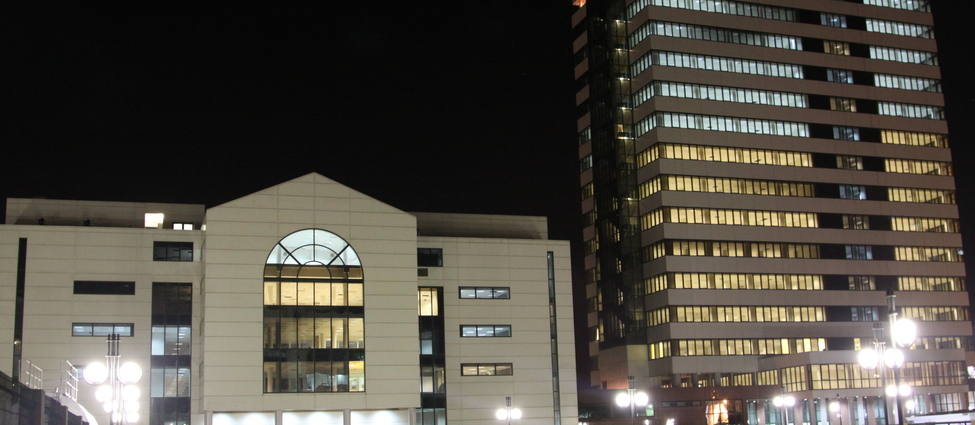

News
President Mahama Meets the Business Community

ACCRA, GHANA - President John Dramani says Ghana’s agricultural sector will continue to decline in favour of the services sector in terms of contribution to the economy.
According to him, it was normal as a middle-income or developing economy for agriculture’s contribution to Gross Domestic Products (GDP) to slump once the secondary and services sectors were thriving.
“Agriculture will continue to decline and services will continue to increase; manufacturing will continue to increase; mining and quarry will continue to increase,” the President told Captains of Industry during a presidential breakfast meeting in Accra yesterday.
The meeting, under the aegis of the Ghana Investment Promotion Centre (GIPC), was the last of quarterly meetings held for this year.
It was also an opportunity for the President and the government, for that matter, to acquire first-hand information on trends in the business sector and to facilitate a dialogue for workable and sustainable measures.
President Mahama pointed out that Ghana’s economy was showing all the right signals even as the services sector was doing better than the agricultural sector as the highest contributor to Ghana’s GDP, which is what it should be when a country is developing.
“For all the developed countries, the contribution of agriculture to GDP is the smallest; which doesn’t mean that we are not producing enough food to feed
ourselves," Mr Mahama added.
The President said government is focused on reducing the wage bill to 40 percent by the end of 2017 and will, therefore, use all workable measures to ensure its reduction.
He said wage overruns, unsustainable subsidies on petroleum products, and power crisis, placed huge economic challenges on the economy and once government was facing them head-on with the necessary interventions, the wage bill would subsequently reduce to 40 percent of revenue generated.
"In that way, we will be edging towards the standards of International Labour Organisation which allows only 35 percent as wage bills," he said.
The President said government had fast-tracked the provision of 850 megawatts of power within 18 months, and placed austerity tariffs on electricity to ensure sustainability and reduction on government expenditure.
He observed that, over the years, government had worked around the clock to reduce the wage bill that was astronomically raised by the implementation of the Single Spine Salary Structure.
He said government had reduced it from over 70 percent in 2010 to between 49 and 51 percent by 2015 and expressed the hope that it would further reduce to 40 percent by the close of 2017.
On subsidies on petroleum products, President Mahama said since government embarked on the deregulation exercise, prices had remained relatively stable and relieved government of wanton debts it had accrued over the years on account of the subsidies.
He said government would also work hard to reduce the high rate of power losses in the system to sustain the performance of the Electricity Company of Ghana in the provision of power.
The current 25 percent loss the ECG was experiencing through illegal connections and non-payment of bills, he said, was unacceptable and government would, therefore, liaise with viable partners for the ECG to reverse the trend.
Even with the losses and inadequacies, President Mahama explained that over 80 percent of Ghanaians were enjoying sustainable electricity and Ghana placed second to only South Africa in that respect, and gave the assurance that with the current expansion programmes, Ghana could attain 100 percent in the next four years.
President Mahama said provision of potable water to Ghanaians had risen from 58 percent in 2008 to 72 percent this year and hoped that the completion of the second phase of the Kpong Water Project would further increase water supply to more people.
On interest rates and other measures for the flourishing of businesses, President Mahama said government had introduced Public Debt Management Strategy that would ensure its borrowings did not crowd out the private sector businesses.
This, he said, would be done through improved lending to the Small and Medium Enterprises, using the Ghana Export and Import Bank to support businesses and create import substitution, which had begun with the Pharmaceutical and Poultry companies.
The President said although government did not control interest rates from financial institutions, it would ensure stability of prices to compel them to periodically reduce their interest rates.
On the forthcoming December polls, President Mahama said he would play his role diligently as the President of the land to ensure a smooth and peaceful general election.
Government has come under intense criticisms for supervising the declining growth of the sector.
Economists have maintained that reviving the dwindling fortunes and ensuring modernisation of agriculture are the surest ways of turning Ghana’s ailing economy around in the short to medium-term.
According to them, unless government turns its full attention to agriculture through direct and potent policies, required infrastructure, finance and capacity, no sector can lead the change that government seeks in the short to medium-term.
The contribution of agriculture to the country’s GDP has suffered decline since 2009 from 31.8% to about 12.8% as at September 2015.
In between these years, the sector has always recorded a fall in its share to GDP and the services sector overtook agriculture in 2010 as the leading contributor to GDP.
Mr Carl Nelson, the Chief Operations Officer of the Ghana Investment Promotion Centre, said his outfit had successfully organised similar meetings and would continue to do that in the coming days to deepen relations between government and businesses, on one side, and between businesses on the other.
To learn more about WTC Accra, please click on the source link below.